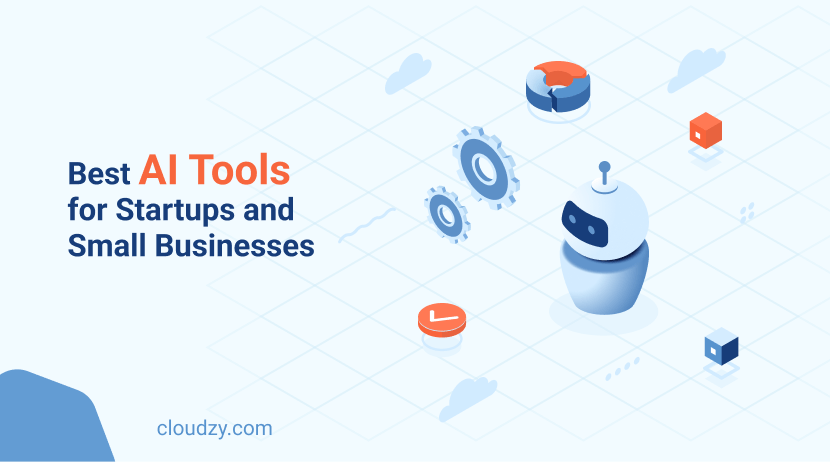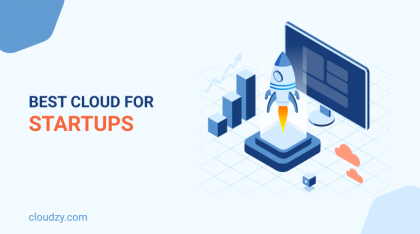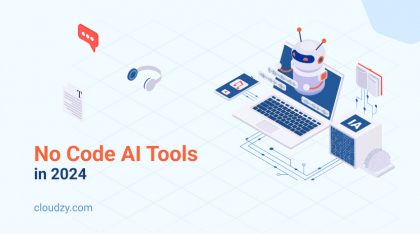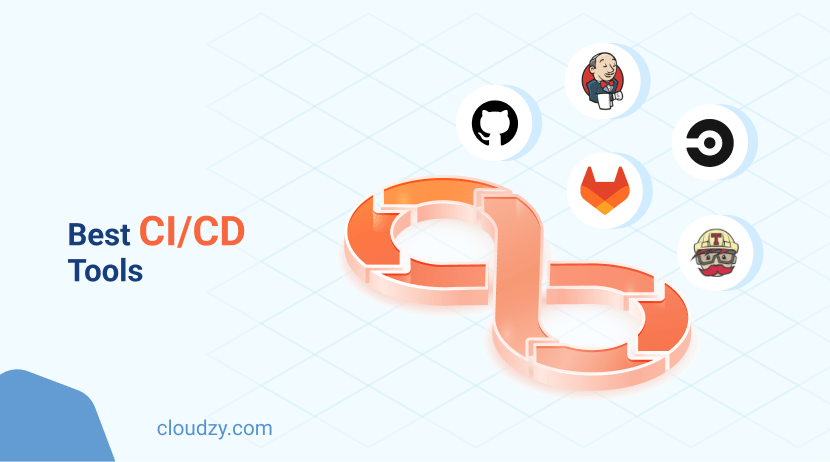Managing a startup is just like raising your own child. The precious idea that you once came up with deserves to flourish and have its moment. However, creating a team of experts who can take matters into their own hands and lead your startup costs a lot. And no matter how advanced your management skills are, you won’t be able to go the whole journey single-handedly. So, what is the solution? How can you develop your idea in a way that will make it thrive and turn it into a successful business?
It hasn’t been that long since the advent of AI, but even in this short period, it has changed many aspects of our personal and professional lives. Thankfully, there are many great AI tools you can use to optimize the management of your startup. These AI tools for startups can enhance your productivity, shape your marketing plan, enhance your customer service, automate your workflows, etc. This blog introduces the best AI tools for startups to transform your business operations and management.
How AI Tools Transform Work Styles
Artificial intelligence has changed how we work in the most unimaginable way possible. These changes haven’t only affected big tech companies. They have also shifted the management and operations of small businesses and startups. And this drastic effect has made AI a not so optional tool. You can’t decide to stay away from AI tools. Isolating your team and business from AI is probably the most harmful strategy you can adopt in 2024. So, here’s how AI is transforming work styles across various everyday tasks and why you shouldn’t resist it:
Streamlined Communication and Collaboration
So far, one of the most important effects of AI for startups has been revolutionizing communication within teams. This effect is more vivid when you look at teams that are spread across different geographies. Tools like Slack and Microsoft Teams use AI to organize messages, prioritize tasks, and even suggest the best times for meetings based on team members’ habits and calendars. This level of automation that is brought to our work environments by AI makes communication much smoother.
Enhanced Customer Service
Customer service is another area in which AI has left a clear footprint. Chatbots and virtual assistants powered by AI are now capable of handling a wide range of customer inquiries. And the most interesting part about these chatbots is that they don’t need any form of human intervention. This shift not only speeds up response times but also allows human agents to focus on more complex tasks or queries. Take a small online retail startup that uses AI to manage basic customer questions about shipping and returns. The best AI tools for startups can help this business free up team members and allow them to focus on other tasks like improving sales strategies. Can you imagine how big of a difference this spare time can make for a small business?
Automated Administrative Tasks
How AI for startups tools can improve administrative tasks? You may ask. AI tools have taken over much of the mundane, time-consuming administrative work. AI applications can schedule meetings, manage email follow-ups, and even set reminders for important tasks. Now, imagine a small business with limited staff members. Automating administrative tasks allows the staff to focus on core activities rather than getting bogged down by repetitive administrative tasks.
Smart Financial Management
Efficient financial management can change how your business operates, especially if you’re on a budget. AI tools for startups have made financial management easier and less cumbersome. AI-powered tools now assist with everything from bookkeeping to tax preparation, expense tracking, and financial forecasting. These tools can analyze past financial data to predict future trends to help you make informed decisions for your business. Imagine you want to forecast quarterly expenses and revenues. You can use AI tools to manage this task perfectly.
Personalized Marketing
Marketing efforts have also been transformed by AI tools for startups. There are AI tools that are designed to analyze customer data and deliver more personalized content. AI algorithms can help you understand your customers’ preferences and purchasing behavior. You can then use this information for crafting targeted marketing campaigns that speak directly to the consumer’s needs and increase conversion rates.
In each of these examples, AI tools for entrepreneurs and small businesses streamline operations provide deeper insights, enhance customer interactions, and free up valuable time for strategic thinking and innovation. If you adopt these AI tools for startups, you can keep up with industry standards and set new benchmarks for efficiency and success. This is why understanding and integrating AI tools into daily operations is more of a necessity than a choice in modern businesses.
Top 5 AI Tools for Startups
After talking about how AI is able to transform work styles, it’s time to introduce the best AI tools for startups. In this section, you’ll see a list of the best AI tools for startups from which you can choose the options that suit your organizational needs.
1. ChatGPT (Customer Service and Engagement)
We all know about ChatGPT and how magical it can be. Actually, ChatGPT is the AI tool that transformed how the public thinks about and reacts to AI technologies. This AI tool for startups can do so much on its own that finding its strengths and focusing on them is a bit confusing. I mean, you can literally use it for anything from content creation to idea generation, customer support, and even data analysis. But in this blog, we’ll only focus on how it can enhance customer service and engagement. ChatGPT can be a great option for startups and small businesses who want to enhance their customer interaction. ChatGPT can easily integrate into your website or your customer service system to automate and handle inquiries. Since it uses natural language processing(NLP), it can precisely understand and respond to customer queries with detail.
However, just like any other newly introduced tool, ChatGPT has a few downsides. For example, ChatGPT may struggle with complex or nuanced customer requests that require human empathy or deep understanding. Another possible downside of ChatGPT is that it requires lots of training with your organization’s data. The accuracy and effectiveness of its responses depend heavily on the training data, which may need frequent updates. But even considering these facts, using ChatGPT for customer support is better than not using it and missing out on its benefits.
2. MonkeyLearn (Data Analysis and Automation)
In our list of best AI tools for small business, we should definitely include a tool for data analysis. This technological age is strongly driven by data and numbers. Data analysis can give you lots of helpful insights into your operations, customer behaviors, and market trends. MonkeyLearn harnesses the power of AI to automate workflows and analyze text data. That’s why it’s a great tool for startups that need to process large volumes of data quickly. Businesses can extract valuable insights and trends that inform product development and customer service improvements by applying machine learning to analyze customer feedback, support tickets, and social media mentions. MonkeyLearn easily does that for you. Its easy-to-use platform allows even non-technical users to build custom models tailored to their specific needs. This means more informed decisions and less guesswork.
Although MonkeyLearn is a user-friendly AI tools for small business, you should be aware that using it requires some initial learning. Another important concern about MonkeyLearn is that it’s highly dependent on the quality of your data. So, if you input data with low quality or validity, you will tweak the effectiveness of the analytical insights.
3. PaveAI (Marketing and Analytics)
What is more important for a small business than effective marketing? In the early stages of a business, raising brand awareness, showing yourself to potential customers, and enhancing sales are very important. AI tools for startups have also entered the realm of marketing, and PaveAI is one of those tools that we’ll focus on here. PaveAI is designed to transform the way startups approach marketing by turning analytics data into actionable insights. It easily integrates with Google Analytics and uses AI algorithms to analyze traffic and conversion data. This way, it can help you understand what strategies are working and which are not. This tool is particularly useful for optimizing marketing budgets and strategies because it suggests adjustments that can lead to better ROI.
Although PaveAI provides great analytical insights, its insights and data can be complex and require a good understanding of marketing analytics. Besides complexity in interpretation, you may face another challenge while working with PaveAI. This AI tools for startups is highly reliant on Google Analytics data which might not provide a complete picture if you’re also using other analytics tools.
4. Jasper (Content Creation)
Content is the most important gateway by which you can communicate with your customers. Jasper is a content creation assistant that uses AI to help you in generating engaging and relevant written content across a variety of formats. From blog posts to email newsletters, Jasper can save you a lot of time and effort while producing high-quality content. This tool is particularly beneficial for startups that need to maintain a robust online presence but don’t have the resources to employ full-time writers.
Relying too much on AI for writing content is a bit risky. This reliance has the potential to kill creativity and bore your audience. So, the first challenge in working with Jasper is to be aware of its limitations. The next challenge in using Jasper is that AI-generated content often requires human editing to tailor tone. So, in the end you definitely need to spend some time editing the text that jasper has generated.
5. Forethought (AI-Powered Customer Support)
Customer support is directly related to customer satisfaction. If your startup is able to offer high-quality customer support, you can be sure that your customers will be loyal to your brand. Forethought is an AI-powered tool that revolutionizes customer support by predicting and solving customer issues before they turn into serious issues. Forethought can integrate with the existing support tools. It then sorts and prioritizes inquiries, directs them to the appropriate channels, and suggests automated responses that can resolve common issues in no time. This can enhance the efficiency of the support team and allow you to provide a higher level of service without additional overhead.
Before starting to use Forethought you need to know that the initial configuration and integration process with the current support tools can take some time. Another possible challenge is that the automated responses of Forethought may not always align with customer expectations. So, you need to monitor its performance from time to time.
This section covered five useful tools that can help you in handling different aspects of your startups. But you need to remember that these tools and use cases don’t show the whole scope of AI’s potential in changing your business operations.
Exploring Advanced AI Tools for Small Businesses
If we want to cover all the potentials of free AI tools for startups we should also talk about more advanced tools like Google Cloud AI and IBM Watson Assistant. Let’s see what these tools are and how they help startups and small businesses.
Google Cloud AI
Google Cloud AI has a comprehensive suite of AI services that allow developers of all skill levels to implement machine learning and AI into their applications. It provides everything from AutoML to various pre-trained APIs that accomplish to specific tasks such as speech recognition, natural language processing, and image analysis. But why does that matter for startups and small businesses? Take a small e-commerce startup as an example. This startup can use Google’s Vision AI to enhance product discovery. Google’s Vision AI can help with this process by enabling image-based searches, where customers upload photos to find similar products. Another example would be using Google’s Natural Language API to analyze customer feedback on social media and improve services and address negative feedback immediately.
IBM Watson Assistant
IBM Watson Assistant is designed to build smarter AI-powered chat bots that you can use across lots of channels, including mobile devices, messaging platforms, and even robots. Watson Assistant is great at understanding nuances in language and delivering meaningful and relevant responses. This way, it can make interactions seem more human-like. IBM Watson Assistant is useful for startups and small businesses who want to enhance customer services without expanding their human workforce. For instance, a small healthcare provider could use Watson to offer 24/7 customer support. Watson can answer frequently asked questions about services, book appointments, and provide basic health advice. This is how it can be among the best AI for entrepreneurs.
5 Benefits of Using Cloud VPS to Power AI Tools for Startups and Small Businesses
Using a dependable cloud VPS provider like Cloudzy can enhance the AI capabilities of startups and small businesses. It can be the cherry on top of a refreshing ice cream. It just makes things better. Here are five key reasons why a robust cloud VPS is important for integrating AI tools for startups:
- Accelerated AI Processing: Our VPS solutions, equipped with high-speed SSDs, provide the necessary computational power to run AI tools efficiently.
- Cost Efficiency: With our scalable and affordable pricing plans, startups can deploy AI solutions without compromising on other important investments.
- Easy Scalability for AI Projects: As your AI demands grow, you can easily scale your resources with our VPS services to handle larger datasets and more complex models.
- Secured AI Data: We protect your sensitive data with advanced security measures to make sure it remains safe from cyber threats.
- Reliable Uptime for AI Applications: A 99.95% uptime guarantee makes sure that your AI systems are always operational.
Using Cloudzy as the host for your AI tools can definitely make a huge difference in how you manage your business and how you integrate AI into your corporation. So, if you want to benefit from the combined power of AI and Cloud technology, make sure to check out our cloud VPS solution.
Conclusion
In this blog, we talked about how AI is transforming startups and small businesses. Incorporating AI tools for startups is the best decision you can make in the early stages of your business. The AI tools for small business and startups can become the most helpful members of your team and help you in improving your business.
FAQ
What is the best AI tool for small business?
There is no universal answer to this question, as each business faces its own unique challenges. Therefore, it’s important to select the best AI tool based on the specific needs of your business.
How AI is used in startups?
Startups use AI to gain competitive advantages by getting predictive analytics, personalized customer experiences, and automated operational tasks. AI technologies help startups optimize their strategies, improve decision-making, and enhance product offerings by benefiting from the best AI tools for startups.
What are the best free AI tools for business?
The best free AI tools for business include Google Cloud AI and IBM Watson Assistant. These platforms provide powerful machine learning and natural language processing capabilities to help businesses automate interactions and analyze data without upfront costs.
How do AI tools for entrepreneurs improve business operations?
AI tools help entrepreneurs streamline operations by automating routine tasks, providing precise analytics, and enhancing customer engagement. These improvements can result in better efficiency, reduced costs, and more informed decision-making.





